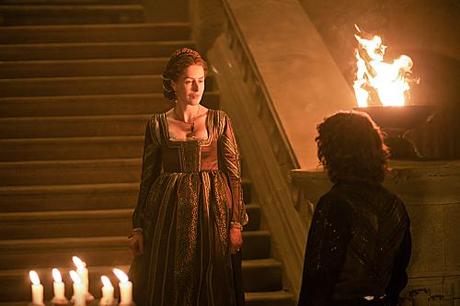Contributor: John Keegan
Written by Neil Jordan
Directed by Kari Skogland
After a string of solid episodes, I can’t help but think that Jordan slipped back into some bad habits with this one. It wasn’t terrible, by any means, but it felt a bit overwrought when events culminated in bloodshed. It’s also possible that the shift in directors had something to do with it, but whatever it was, it was noticeable.

Anyone who thought that the series was lacking a bit of carnality certainly got what they wanted in this episode. Cesare and Catherina’s constant coupling was a feast for the eyes, as just about every typical sex position got its moment of demonstration in one part of Forli or another. I’m not exactly a prude when it comes to such things, but I did find it tiresome, especially once it was driven home that Catherina was simply taking the most pleasurable path towards stalling.
Not to put too fine a point on it, since it doesn’t really bother me from a personal perspective, but the intercut of Cesare and Catherina with Micheletto and his lover felt like an intentional way for Jordan to push boundaries and challenge the audience. It wouldn’t be the first time; the romantic elements in “The Crying Game” were an equally blatant attempt to pull the audience into something they might usually avoid. I simply found it inelegant in execution.
Historically, Catherina is well known for being a powerful woman in a time when such things were relatively rare. For better or worse, that also means she has a bit of a reputation across the board. It makes sense, then, for her to rebuff Cesare by taking advantage of his presence and youthful vigor. That she and Cesare become bitter enemies is also a factor, since this goes a long way towards explaining why he has a personal grudge.
That said, while the bloody dispatch of Giovanni Sforza made for a chilling reminder that Cesare is far from heroic, and a bit unbalanced, it does completely against the historical record. Not that this is a new thing for “The Borgias”, but it felt out of place, even if it was a way to settle accounts for his treatment of Lucrezia in the first season.
Much of the rest of the episode was setup for the second half of the season. I like this idea of Lucrezia, Vanozza, and Giulia banding together to grab a stake in the political realm. It just wasn’t the most involving material, even with the three woman and their particular positions within the “family”. Similarly, the increased presence of Savonarola and his involvement in Rovere’s plans to assassinate Rodrigo was good stuff, but clearly just a step along a much longer path to the end of the season.
That brings me to the big moment at the end, when lightning strikes St. Peter’s, causing a massive collapse of the portion of the roof over the altar. The end result is a lot of blood and death, and a surprising amount of heroism and sincere religiosity from Rodrigo. He may be a power-hungry monster much of the time, but I love how moments like this humanize him, showing that even the corrupt can have admirable qualities in the right circumstances. It was also one of the most horrifying action sequences that this series has ever produced; kudos to the production team for pulling it off.
All that said, I felt it was as heavy-handed as the interplay with Cesare/Catherina and Micheletto earlier in the episode. Intercutting the chaos at St. Peter’s with Cesare’s brutal murder of Giovanni, and capping it off with Rodrigo’s proclamation that the deaths are a sign of God’s punishment for their sins, had all the subtlety of the hammer to the face. And since I couldn’t find a reference to a lightning strike that damaged the basilica that extensively (though, admittedly, I didn’t spend much time on it), it felt like an artificial construct to prop up what was otherwise a fairly slow transitional episode.
Writing: 1/2
Acting: 2/2
Direction: 2/2
Style: 1/4
Final Rating: 6/10

